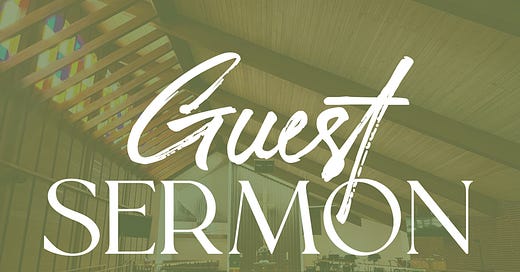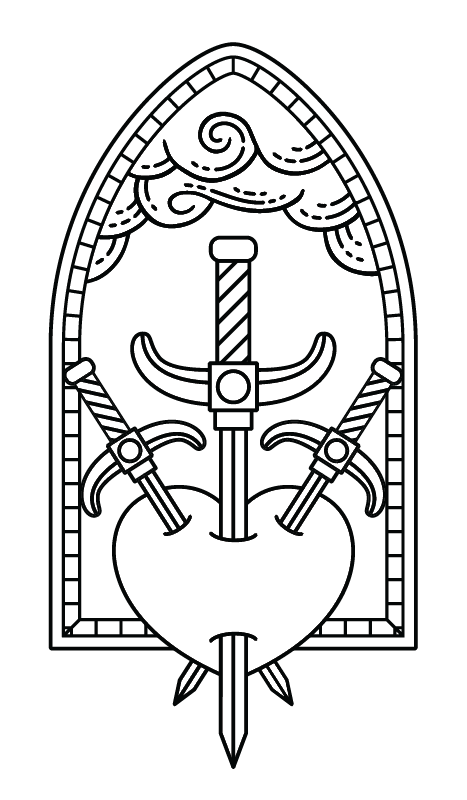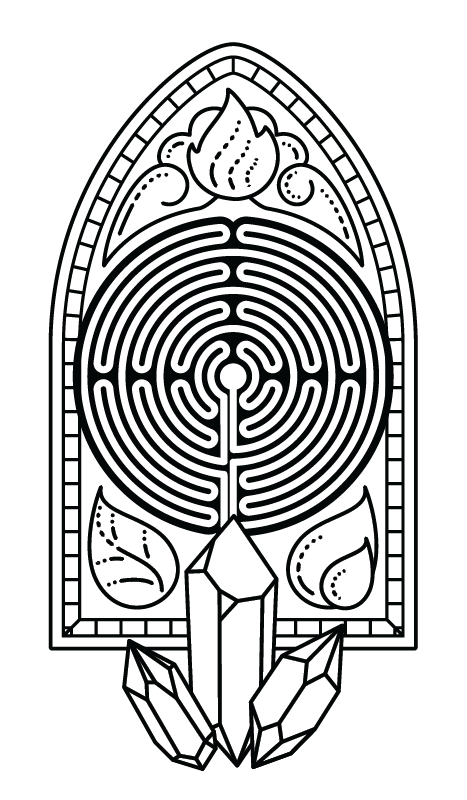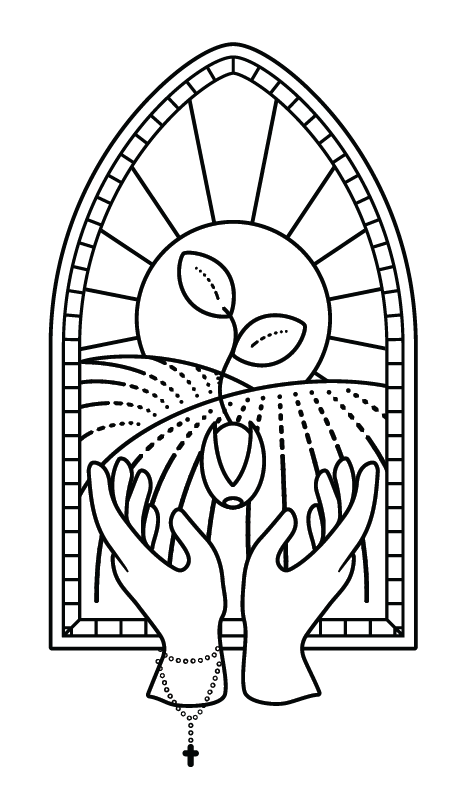Raise your hand if you’ve ever held a grudge.
The Oxford Dictionary defines a grudge as, “a persistent feeling of ill will or resentment resulting from a past insult or injury.” Synonyms for ‘grudge’ include ‘rancor’, ‘enmity’, ‘sullen malevolence’, and my personal favorite: ‘cherished malice.’
Pause with me for a moment and just notice what those words feel like in your body. What happens when I say malice, or malevolence, or enmity? I notice an immediate heaviness in my chest. My shoulders kind of droop. I can even feel my lip curling a little, like the words taste bad in my mouth.
Why on earth would anyone want to cherish malice? Why would I ever hold a grudge if the very word feels awful in my body? Why would I cling to something that feels, frankly, terrible?
We’re going to explore this today through the story of Bartimaeus, a blind man on a roadside outside Jericho. It would be easy to assume this is a story about the miracle of his restored eyesight. But I think the story here is much bigger. I think this is a story about restored desire.
Psychology Today defines an addiction as, “[the] compulsive use of a substance or behavior despite harmful consequences.” It’s easy to look at the individual scale and see how food, or sex, or television, or prescription drugs can hurt a person who compulsively mis-uses them. But addiction doesn’t only happen to a single individual here or there. Addiction can happen to entire groups of people. A group can become addicted to a way of being in the world, and it can double down on that way of being in the face of all rational evidence that that way of being is causing harm.
We have, at this point, all the evidence there is that gas-fueled internal combustion engines are actively inimical to life on this planet. Ours, and others’. Has that stopped us from compulsively consuming oil? Or are we addicted to a tool we inherited from our culture and refusing to see its impact on the world around us? These systemic challenges are what happens when humans desire safety, or convenience, or control, more than we desire life.
This dynamic is present in our scripture passage, if you look at verse 48. The crowd around blind Bartimaeus wants him to be quiet. They desire compliance, and politeness, more than they desire his healing. It’s easy to sit in this church two thousand years later and think, “Well, they’re just jerks.” But all of us who just raised our hands when I asked about grudges, we’ve done this. I’ve desired self-righteousness more than I desired reconciliation and relationship. I have cherished malice toward another human even though it hurt me to do it. What gives?!
Theologically, addiction is a symptom of a dis-oriented desire. It is wanting something that we think is going to take us toward aliveness and vitality, and ignoring – or being unable even to recognize – the plain evidence that what it’s actually taking us toward is death. Desire itself is not the problem! Desire is a good God-given thing! But it’s a good thing that can be dangerous depending on where it’s pointed. To think of it another way, our desires are like garden plants. Sometimes they’re vibrant and lively and fruitful. Other times, they’re susceptible to diseases, and they need a gardener’s help to prune them to keep that sickness from spreading and killing the plant.
But how often do any of us check in with our inner garden to take a look at whether our desires are healthy? How often do we pause and ask ourselves what it is we really want? Too many of us don’t even recognize that that’s a question, let alone sit with it. Why?
Because desire, it turns out, is an inherited thing.
It’s social. We get it from somebody else.
As humans, we learn what to want based on what we see other people wanting. Right? This is the whole premise of marketing. We see somebody else enjoying a thing, suddenly we want that thing too. That’s why we now have an entire professional class of people called ‘influencers’. Their job is literally just to be seen liking products. That’s it. They get paid for this! Because it works.
We sometimes think that our desires and our thoughts are ‘the real us’ and our bodies are just some biological burden we have to lug around in order to have our desires & thoughts. But actually, my body is the only thing that is truly and exclusively ‘me.’ Nobody else in the entire history of the cosmos will ever experience this world through exactly this body in exactly this place in physical space, in exactly this moment in time. My body is the part of me that is individual. My desires are the part of me that’s influenced by others, beginning with my family of origin and my culture, and those inherited desires get remixed as they’re processed through my individual body with its unique life experiences, which is why we’re not all just carbon copies of one another.
But if desire is inherited, who was the original Other? Where did humans acquire our first social desires?
This, it turns out, is the story told by the Bible in the book of Genesis. The story goes that when humans were first created, our only desire was for God. And we had God, walking alongside us in friendship, and so life in the Garden of Eden was wonderful – everything was in perfect relationship. When our desire is from God and for God, the result is aliveness for every living thing. Life, and life abundant.
But the Genesis story tells that a serpent enters the picture. And this serpent introduces humans to a desire for something other than God. The snake tells Eve she’s deficient, that she’s lacking in wisdom she ought to have. And he points to an apple and says, “If you just have that thing, though, then you’ll be wise enough. Then you’ll be okay.”
Our serpent is the original influencer.
So humans have two conflicting desires in us, now. We have a desire inherited from God, which is a desire for relationship, based in the radical truth that we are perfect and beloved just the way we are. And on the other hand we have a desire inherited from the serpent, which is a desire for control that’s based in the lie that we are anything but perfect. And unfortunately, human culture has been colonized by the serpent. That’s what the proverbial Fall is: not an individual character failing, but a collective dis-orientation of human desire, an addiction to judgment and rivalry and control.
Christ does not ask us to be in control. Christ asks us to be in relationship.
Friends, you do not need that apple to be okay. You do not need to be wise enough, you do not need to be rich enough, you do not need to be wounded enough, or poor enough, or oppressed enough to be loved. You are loved right now, the way you are, to the absolute maximum it is possible to be loved. Everything there is, is already yours in Christ. It might not feel that way, all the time. Or even most of the time. But I hope you can trust that reality even when it doesn’t feel like reality. Your feelings are valid, but they’re not necessarily true. The ultimate reality is that you are loved and lovable, regardless of what you think you lack. Regardless of what you think you’ve done wrong. But here’s the thing: other people are also loved and lovable, regardless of what you think they’ve done wrong. Every single one of us is the villain in somebody’s story.
So what does any of this have to do with our friend Bartimaeus? Took me a while to get around to him but I promise I haven’t forgotten. Bartimaeus is a human who has let go of his dis-oriented desires.
As a blind man, Bartimaeus is a person for whom human culture does not work.
He used to have sight. We can see that in verse 51, where he says, “I want to see again.” So we know he wasn’t born blind. He could see before; now he can’t. So presumably, culture used to work for him, at least to some degree. He had a place, he knew where he fit. He wanted the things he had been taught to want by his culture, and as long as he had his sight, he probably had a decent chance at acquiring those things. If you occupy a position of social privilege, the system works for you.
But the thing about a culture addicted to control is that it doesn’t work for everybody. Control requires that there’s somebody to be controlled. And when Bartimaeus loses his sight, he loses the social status his able-bodied privilege had afforded him. He’s no longer considered ‘whole’. He’s relegated to the outskirts of his community, begging by the side of the road like we see in verse 46.
And Bartimaeus immediately sees that this is not aliveness. So Bartimaeus has stopped wanting what his culture taught him to want. Instead, when he hears Jesus coming along the road in verse 47, something in his body lights up. That! he says to himself. Something about that guy. That’s the real aliveness. And he cries out and he begs Jesus for attention.
And what does the crowd do? The crowd tries to control him. Verse 48 – “Many rebuked him so that he would be quiet.” To his culture, Bartimaeus’ desire for Jesus seems weird. How dare he raise his voice, how dare he be loud and demanding. How dare he shamelessly break the social rules and be rude. But precisely because of his blindness, Bartimaeus can see that their desire for compliance, for control, is actually not aliveness. It’s an addiction. The crowd is trying to come between him and Jesus. To come between him and life.
Who’s really blind, in this picture? ‘Cause it’s not Bartimaeus.
The good news is, Bartimaeus is not having their nonsense. He just doesn’t have much of anything to lose. He’s already begging on the side of the road, so he just yells his desire out even louder. “Son of David, have mercy on me.” And Jesus is happy to grant that desire. Jesus stops the whole parade that’s coming along the road and he says to everyone, “Call him.” Jesus hears Bartimaeus’ longing and he calls him closer.
But to come closer, Bartimaeus has to cast off the last of what’s holding him back. Verse 50: “Throwing aside his cloak, he jumped up and ran to Jesus.” He has to let go of that one last element of self-protection that he’s clinging to. He has to let go of his desire for safety in order to pursue his desire for life.
The path to the freedom Christ offers us lies in letting go of the desires that are making us sick.
Bartimaeus’ desire is no longer for status or wealth or comfort or even really for his sight. It’s for Jesus. Only once he gets to Jesus and Jesus asks in verse 51, “What is it you want me to do for you?” Only then does Bartimaeus’ attention turn back to his eyesight. Getting to Jesus was the first step; getting attention from Jesus was the first step. Because once God’s gaze is on us, that’s where we get our true desires. Instead of inheriting his longings from his human culture, colonized by the serpent, addicted to control, now Bartimaeus is inheriting his longings from Jesus himself. Only then does he ask for his sight to be restored.
And we can clearly see the difference this makes. Because once he gets his sight back, Bartimaeus could – in theory – go back to his people. If his longing for sight was inherited from his culture, we’d expect him to go back to the socially acceptable role he presumably had before he became blind. But he doesn’t. He drops everything – he throws off his cloak, just leaves it in the road where it sits! – and follows Christ. He is now, by his culture’s standards, even weirder than he was as a blind beggar. They could understand him as a beggar. They had a mental category for that. It was a crappy role, sitting lonely on the side of the road, but they could gauge where he fit in the social order. They had him under control.
But walking away from the possibility of restored social privilege in order to go after some wacky peripatetic preacher? Who does that?! They have no context for this! He looks totally bonkers.
Do we have any gardeners in the room? You don’t prune a plant because it’s bad. You’re not trying to turn it into something it isn’t. You prune a plant to work with its nature, to help it thrive and grow into its most gloriously abundant and fruitful form. To help it focus its energy on aliveness.
I’ve always liked the story that the first disciple to see the resurrected Jesus mistook him for a gardener. What if she wasn’t wrong after all?
Following Jesus will be a pruning. It WILL feel like loss, sometimes. Following Jesus to the cross means allowing him to liberate us from what keeps us begging for scraps on the side of that road.
The path to the freedom Christ offers lies in letting go of the desires that are making us sick.
Jesus can teach us to want something different. Something more life-giving. But it’s going to come at a price. We’re going to have to let go of things that our culture says are valuable. We’re gonna have to let go of safety. We’re gonna have to let go of certainty. We’re gonna have to let go of social regard. Just like that younger version of me, cherishing the malice of a grudge, these things are not good for us to cling to. They seem like they’re gonna take us toward aliveness, but all they do is keep us small, stuck, scared, ashamed, controlling. We are, every one of us, God’s children. Some of us might no longer be children biologically, but we are still children spiritually. We need Jesus to teach us which desires will take us eternally toward life.
This isn’t something we can make happen in ourselves. We can’t re-orient our own desires. It’s something to receive, not something to achieve. But we can make a choice about who we’re receiving from – Christ, or the serpent.
Following Jesus is not a “get out of suffering free” card. On the contrary, learning to follow your God-given longings in a culture that’s trying to shout you down and control you is not going to be a comfortable process. It will require us to be brave. To be weird. To embrace our vulnerability. It demands trust in resurrection, and putting down all those apples I think I need to be okay in the world, until there’s nothing holding me back from throwing off that cloak and running toward the mercy and friendship of Christ.
Because the life and peace that Christ gives us is real in a way the world’s glory can’t compete with.
Let’s try a little experiment here. I’m going to say a sentence out loud and I want you to be still for a moment and notice what happens in your body when I say it. Maybe you even repeat it to yourself in your head a few times and just notice what happens physically in response to these statements. Ready? Everybody take a breath.
First statement is, “I need to be fixed.”
What do you notice? I notice that heaviness in my chest again. I notice my posture curve in on itself, like I’m trying to protect my vital organs. My lip’s curling again. It doesn’t feel good.
Aight, now shake that off a little bit. Take another breath.
Statement number two: “I am meant to live in peace.”
The heaviness lifts; I take a deep breath. My skin feels warmer. A small smile comes onto my face. My heartbeat slows down a little, like I’m relaxing.
Which of those sensations feels like aliveness, to you? Which one feels like freedom? Which statement sounds like Christ?
Friends, as we consider Bartimaeus’ story, we see a man who has paid attention to this aliveness. It’s taken him on a journey from living as the world’s reject to coming truly alive in Christ. Bartimaeus models the courage to throw off the protective cloak of safety, status, and control, crying out instead for God. Longing for Jesus will mean letting go of things our culture prizes, but it leads us to a fuller, freer life. The path to the freedom Christ offers lies in letting go of the desires that are making us sick.
This week I invite you to pay attention to what feels like aliveness, in your body. If you’re really paying attention, this exercise is likely to surprise you. You will find that things you think “should” light you up really don’t, and things you wouldn’t have expected might bring you a surprising amount of joy. You will almost certainly encounter some grief that you’ve maybe been too busy to feel. Aliveness isn’t always perfectly comfortable. But it will always feel true in our bones.
As you go into the week ahead, practice bringing your longings prayerfully before Jesus. Ask God to help you notice when a desire brings you alive — and when it might need a little pruning. Like Bartimaeus, may we have the courage to cry out our longings, to seek Christ’s life-giving presence, and to throw off what’s holding us back from following where He leads.










